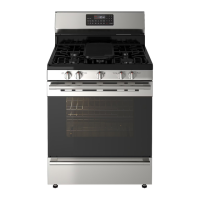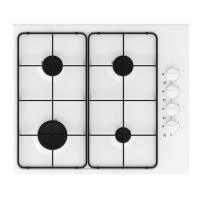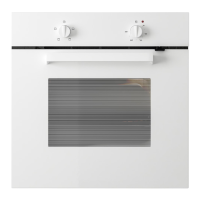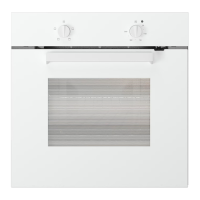12
EN
BEFORE SETTING SURFACE CONTROLS
Using Proper Cookware
The size and type of cookware used will influence
the heat setting needed for best cooking results. Be
sure to follow the recommendations for using proper
cookware as illustrated in “Figure 1: Testing cook-
ware” and “Figure 2: Proper cookware”.
Figure 1: Testing cookware
Check for flatness by ro-
tating a ruler across the
bottom of the cookware
(see “Figure 1: Testing
cookware”). Cookware
should have flat bottoms
that make good contact
with the entire surface of
the heating element.
• Flat bottom and straight
sides.
•Tight fitting lids.
• Weight of handle does
not tilt pan. Pan is well
balanced
.
•Pan sizes match the
amount of food to be
prepared and the size
of the surface element.
•Made of material that
conducts heat well.
•Easy to clean.
•Always match pot
diameter to element
size.
•Curved and warped pans.
•Cookware larger than
cooking area marked on
cooktop by more than
one-half inch or 12mm.
•Heavy handle tilts pan.
•Pan is smaller than the
heating area marked on
cooktop.
Cookware Material Types
The cookware material determines how evenly
and quickly heat is transferred from the surface
element to the pan bottom. The most popular ma-
terials available are:
• Aluminum - Excellent heat conductor. Some
types of food will cause it to darken (Anodized
aluminum cookware resists staining and pit-
ting).
• Copper - Excellent heat conductor but discol-
ors easily (see Aluminum).
• Stainless - Slow heat conductor with uneven
cooking results. Durable, easy to clean, and
resists staining.
• Cast Iron - A slow heat conductor, but will re-
tain heat very well. Cooks evenly once cooking
temperature is reached.
• Porcelain-enamel on metal - Heating char-
acteristics will vary depending on base mate-
rial.
• Glass - Slow heat conductor.
IMPORTANT
Do not place empty aluminum, glass, or porcelain-
enamel coated cookware on the element. The
melting point of cookware made with these ma-
terials may be reached quickly, especially if left
empty. If the cookware melts it will damage the
cooktop. Follow all the cookware manufacturer’s
recommendations for use and care of cookware.
NEVER place or straddle a cooking utensil over two
different surface cooking areas at the same time.
Incorrect use may damage the cooktop.
Figure 2: Testing cookware
BEFORE SETTING SURFACE CONTROLS
